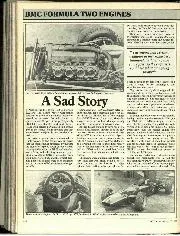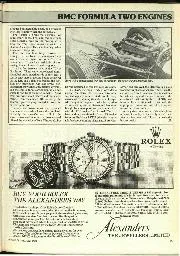

A sad story
Early in the life of the 1000cc Formula Two, the British Motor Corporation decided to produce an eligible engine to extend its successful Formula Junior cooperation with Cooper. A budget…
M U 1) !
By E. V. G.
IN answer to the perfect tornado of requests showered upon me from all directions (mainly in the form of single tickets to Colney Hatch, and even a few, oh ! most unkindest cut ! to Broadmoor), subsequent to the publication in these Columns of any previous outburst, I am perpetrating another, and, if possible, a still more terrible, contribution.
My last effort consisted, if you remember, and even if you don’t, of a series of definitions, put together in the form of a glossary, the whole purporting to be a useful collection of information culled from the uttermost, yea, and even the nethermost, sources, for the sole benefit of those frequently landed gentry who ride in trials in that category known as the Novice Class. This month, however, I am going to assume that all these brethren, even those who are sistren, have become bored with their perpetual removal of first-class and even premier awards. (By the way, with regard to the penultimate word of the last sentence, I have lately heard this pronounced both as ” Preeeemyer ” and as ” Prymearah ” ! The correct pronunciation is, I think, ” Premm-yer,” the ” e” being short as in the case of a 4ft, Gin, policeman.)
However, let us regain control—To return to the prize-winners, I am now about to give these stalwarts a little rather more specific information about the art of Trials riding, as I am sure that by this time, many of them are aching to enter for a really hot-stuff, Number One, L for Leather, B for Honey, Sporting Trial, but are just lacking in that confident knowledge, so necessary to a successful display in the stressful circumstances of a .lippery sylvan setting, but which can only be acquired when experienced persons condescend to explain the technique of the game—not that I think it is really a matter of condescension,—far from it,—actually it is that we expert fellows fail to recognise the almost unbridgeable gulf which exists between us and our lesseducated (motoristically, of course) comrades.
These few lines will form the first (and the last, ED.) of a series of discourses on subjects closely connected with riding in Sporting Trials, and I hope to produce the others at short intervals (every time the cam comes round) (Isn’t ” cam” spelt with a” K” ?—Office Boy). As it is almost always the first (and also the middle and last) thing encountered in a Sporting Trial, mud is to be the subject on which this month’s notes are written.
A diligent search in the tome of one of the more noted of the lexicographers will probably produce the information that mud is a semi-liquid formed by the admixture of earth to a volatile liquid, such as water. This definition, whilst being all very well in its way, and doubtless, up to a point, correct, does not convey to the seeker after knowledge any profound truth as to the exact nature of this widely-known and all-important substance. Let us, therefore, be more concise. Looked at from a technical point of view, muck is known to the more advanced chemists by the formula Mp. D. From this we learn that the substance under review is a compound
with two components, present, in a chemical sense, in equal quantities.
Now, what are these two ingredients ? Aha ! What are they ? Is it necessary for me to tell you that the symbol Mp. represents that little understood element, the co-efficient of friction, or, where, as in the case of mud, friction is a negative quantity, the co-efficient of lack of friction ? This fact alone gives us a basis upon which to start, as we have already ascertained that we are dealing with a slippery substance. Taking timely warning from our newly-acquired knowledge, we dash out and purchase some of those chains so frequently (and, may I observe, erroneously) connected with the clergy, and arm (?) our driving-wheels with a perfect battery of anti-skid devices, only to awake on the morning of the competition in view, to find that a heavy frost has set in, thus rendering the expenditure of both time and s. d. unavailing.
The component D in the formula set out above stands for the word “dirt,” a comprehensive name covering all classes of earth, loam, gravel, clay and chalk.
Thus, a rapid and fairly accurate translation of the formula is : ” Slippery dirt.” How much more precise a definition is this than the one which, as I intimated above, would be given you by Mr. Nuttal or one of his contemporary competitors.
Looked at from any other point of view, mud is objectionable to a degree ; it has a retarding effect on both man and beast, in consequence of which, each of these animals is inclined to run not when encountering mud.
And if pedestrian and equestrian are impeded in their progress through mud, a fortiori, how much more so, and more than that, shall a ferro-equestrian be subjected to the loss of a few never-to-be-regained moments ? You must not infer, however, that mid is a totally useless nuisance : far from it. How would the natives of Central Africa make their houses it there were no mud ? I don’t know. What would be the use of the duck’s two-port throat if there were no mud for him to eject ? Ah ! what ? So you see, one man’s meat is another man’s poison. (And it’s an ill wind that blows no one any mood.—Lancashire Editor.)
Having thus shown you that mud is, and must be, I ivill endeavour to instruct you in the ways in which you may meet this barrier, the surmounting of which proves, from time to time, and yet again to another time, such a difficult task to the competitor. At first, there seems to be three courses open to you. They are : I. Take out the clutch, put the feet firmly on the ground, change into neutral, let in the clutch (hoping and praying that, in your hurry, you have not selected first in mistake for neutral), and finally close the throttle. Detach your competition numbers, locate the nearest observer, and make him a present of them. But (and in
N.B.—p=greek letter used in mathematics for ccefficient of friction.
this you must be firm), insist on his returning to you any deposit you may (or may not) have made before being trusted with those valuable properties.
2. Approach and proceed through the morass in a gingerly manner.
3. Cast all care to the winds, engage a snappy second gear, and cross the Rubicon flaf out.
It is, perhaps, hardly necessary for me to point out that the first of these methods can scarcely be relied upon to accelerate the influx of gold medals.
With regard to the other two methods, such a lot depends on the nerve, verve, vim, and joie-de-vivre of the individual, that it is practically impossible to give any definite advice. Personally, and as far as I am concerned, that is to say, in my case, by which you will gather that I mean to say that my experience is, that in endeavouring to carry out the second motion, I usually find myself executing the third :—not by reason of a sticking throttle, let me hasten to assure you, but rather by reason of the very free construction placed on the word “flat.” But there is much more in it than meets the eye. (I beg to differ !—Act.-Ass.-Jun.-Sub-Ed.) I mean to say, so much depends on local conditions. There may be a gradient, and if there is, you may take it from me that it may be either up or down. There may be observers; (this can’ be checked by Ordnance Map1 inch to mile—which marks all observed sections and Secret Checks with the mystic letters Inn.) I have before now met in colonial sections :
(a) Bull.
(b) Disaster.
(c) Farmer, complete with shot-gun.
(d) Geese (most vindictive, not to say pugnacious).
(e) Waterloo. In case (a), shrieking ” Matador ” at full bore, and hastily stoning my red handkerchief in the inner breast pocket of my gents.’ D.B. natties (Impossible, you
haven’t got any—Temp.-Very-Ass.-Ed. !), I beat it (not the bull).
Item (b) is one the regularity of which is now becoming monotonous. When confronted with (c), I quickly remembered that I was paying a call on the bailiff, and, being a cripple, could not walk across the farmer’s property. The worthy agriculturalist sent me about my business with the remark that I should very shortly be unable to sit if I didn’t durn-well remove my blithering self. I looked at him hard and long. He seemed to me to be a man of sound common-sense, so I took his advice.
With regard to geese, under Schedule D, I am afraid I cannot advise here, as I am always terrified by the noise they make. It sound for all the world like the note of an O.H.V. 500, 10 to 1 compression ratio, doing 12 m.p.h. on a 2 to 1 gear, into a head-wind at gale strength, with mag. fully advanced.
(e)—Waterloo. Well, just look at the first five letters— one of the ingredients of Mud. I maintain that if Comrade Nap. had received education on a motor-cycle, rubber waders would never have been called Wellingtons.
But after all, given a clear run, not necessitating hurried contact with any horny-handed sons of toil, any domestic (?) fowl, or any railway stations, the navigation of mud boils down to a matter of confidence. The longer you think you’ll stay on, the sooner you’ll come off ; and, obviously, the sooner you’re off. the sooner you’ll be on again.
With regard to the selection of gear and throttle setting, I must leave it to the individual, but remember— Keep your feet up as long as is humanly possible, set the throttle so that the ‘bike goes as fast as you dare let it, then open it a bit more, and either you’re through, or ” Zip ! ! ! “
As an aid to carrying out the former admonition, chewing-gum on the footrests is a wonderful help.
Apart from this, learn to control wet and dry skids, but don’t practice on the bye-pass on Sunday when the “Tooting Belle” is about !